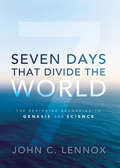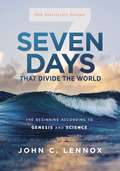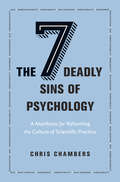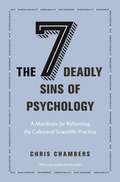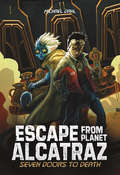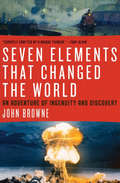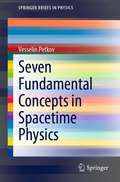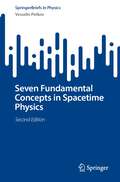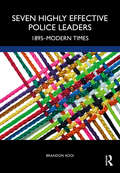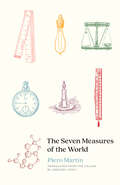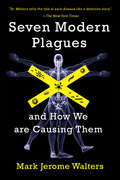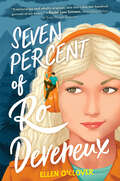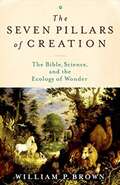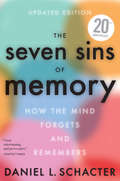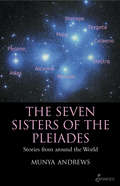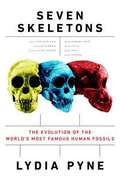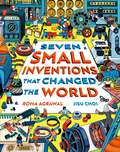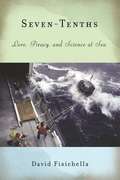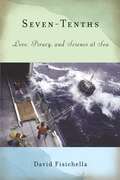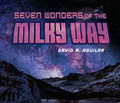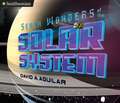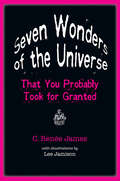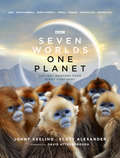- Table View
- List View
Seven Days That Divide the World: The Beginning According to Genesis and Science
by John C. LennoxWhat did the writer of Genesis mean by “the first day”? Is it a literal week or a series of time periods? If I believe that the earth is 4.5 billion years old, am I denying the authority of Scripture? In response to the continuing controversy over the interpretation of the creation narrative in Genesis, John Lennox proposes a succinct method of reading and interpreting the first chapters of Genesis without discounting either science or Scripture. With examples from history, a brief but thorough exploration of the major interpretations, and a look into the particular significance of the creation of human beings, Lennox suggests that Christians can heed modern scientific knowledge while staying faithful to the biblical narrative. He moves beyond a simple response to the controversy, insisting that Genesis teaches us far more about the God of Jesus Christ and about God’s intention for creation than it does about the age of the earth. With this book, Lennox offers a careful yet accessible introduction to a scientifically-savvy, theologically-astute, and Scripturally faithful interpretation of Genesis.
Seven Days that Divide the World, 10th Anniversary Edition: The Beginning According to Genesis and Science
by John C. LennoxNow revised and updated--John Lennox's acclaimed method of reading and interpreting the first chapters of Genesis without discounting either science or Scripture. What did the writer of Genesis mean by "the first day?" Are the seven days in Genesis 1 a literal week or a series of time periods? If I believe that the earth is 4.5 billion years old as cosmologists believe, am I denying the authority of Scripture?With examples from history, a brief but thorough exploration of the major interpretations, and a look into the particular significance of the creation of human beings, Lennox suggests that Christians can heed modern scientific knowledge while staying faithful to the biblical narrative. He moves beyond a simple response to the controversy, insisting that Genesis teaches us far more about the God of Jesus Christ and about God's intention for creation than it does about the age of the earth.With this book, Lennox offers a careful and accessible introduction to a scientifically-savvy, theologically-astute, and Scripturally faithful interpretation of Genesis.Since its publication in 2011, this book has enabled many readers to see that the major controversy with which it engages can be resolved without compromising commitment to the authority of Scripture. In this newly revised and expanded edition, John clarifies his arguments, responds to comments and critiques of the past decade since its first publication. In particular, he describes some of the history up to modern times of Jewish scholarly interpretation of the Genesis creation narrative as well as spelling out in more detail the breadth of views in the Great Tradition of interpretation due to the early Church Fathers. He shows that, contrary to what many people think, much of the difficulty with understanding the biblical texts does not arise from modern science but from attempting to elucidate the texts in their own right.
The Seven Deadly Sins of Psychology: A Manifesto for Reforming the Culture of Scientific Practice
by Chris ChambersWhy psychology is in peril as a scientific discipline—and how to save itPsychological science has made extraordinary discoveries about the human mind, but can we trust everything its practitioners are telling us? In recent years, it has become increasingly apparent that a lot of research in psychology is based on weak evidence, questionable practices, and sometimes even fraud. The Seven Deadly Sins of Psychology diagnoses the ills besetting the discipline today and proposes sensible, practical solutions to ensure that it remains a legitimate and reliable science in the years ahead.In this unflinchingly candid manifesto, Chris Chambers draws on his own experiences as a working scientist to reveal a dark side to psychology that few of us ever see. Using the seven deadly sins as a metaphor, he shows how practitioners are vulnerable to powerful biases that undercut the scientific method, how they routinely torture data until it produces outcomes that can be published in prestigious journals, and how studies are much less reliable than advertised. He reveals how a culture of secrecy denies the public and other researchers access to the results of psychology experiments, how fraudulent academics can operate with impunity, and how an obsession with bean counting creates perverse incentives for academics. Left unchecked, these problems threaten the very future of psychology as a science—but help is here.Outlining a core set of best practices that can be applied across the sciences, Chambers demonstrates how all these sins can be corrected by embracing open science, an emerging philosophy that seeks to make research and its outcomes as transparent as possible.
The Seven Deadly Sins of Psychology: A Manifesto for Reforming the Culture of Scientific Practice
by Chris ChambersWhy psychology is in peril as a scientific discipline—and how to save itPsychological science has made extraordinary discoveries about the human mind, but can we trust everything its practitioners are telling us? In recent years, it has become increasingly apparent that a lot of research in psychology is based on weak evidence, questionable practices, and sometimes even fraud. The Seven Deadly Sins of Psychology diagnoses the ills besetting the discipline today and proposes sensible, practical solutions to ensure that it remains a legitimate and reliable science in the years ahead. In this unflinchingly candid manifesto, Chris Chambers shows how practitioners are vulnerable to powerful biases that undercut the scientific method, how they routinely torture data until it produces outcomes that can be published in prestigious journals, and how studies are much less reliable than advertised. Left unchecked, these and other problems threaten the very future of psychology as a science—but help is here.
Seven Doors to Death (Escape from Planet Alcatraz)
by Michael DahlAs Zak Nine and his friend Erro make their way around a strange lake, they discover an ancient golden building. The boys decide to go inside to take a closer look, but unwittingly stumble into the legendary Octagon: an underground chamber with eight mysterious doors. One door will lead the boys to freedom, but the rest lead to sinister traps and certain death! Will Zak and Erro outwit the deadly room and escape before it's too late?
Seven Elements That Have Changed the World: An Adventure of Ingenuity and Discovery
by John BrowneWith carbon we access heat, light and mobility at the flick of a switch, while silicon enables us to communicate across the globe in an instant.Yet our use of the Earth's mineral resources is not always for the benefit of humankind--our relationship with the elements is one of great ambivalence. Uranium is both productive (nuclear power) and destructive (nuclear bombs); iron is the bloody weapon of war, but also the economic tool of peace; our desire for alluring gold is the foundation of global trade, but has also led to the death of millions. John Browne, CEO of BP for twelve years, vividly describes how seven elements are shaping the world around us, for better and for worse.Combining history, science and politics, Seven Elements takes you on a present-day adventure of human passion, ingenuity and discovery. This journey is far from over: We continue to find surprising new uses for these seven elements. Discover how titanium pervades modern consumer society, how natural gas is transforming the global energy sector, and how an innovative new form of carbon could be starting a technology revolution.
Seven Fundamental Concepts in Spacetime Physics (SpringerBriefs in Physics)
by Vesselin PetkovThe book presents seven fundamental concepts in spacetime physics mostly by following Hermann Minkowski’s revolutionary ideas summarized in his 1908 lecture "Space and Time." These concepts are: spacetime, inertial and accelerated motion in spacetime physics, the origin and nature of inertia in spacetime physics, relativistic mass, gravitation, gravitational waves, and black holes. They have been selected because they appear to be causing most misconceptions and confusion in spacetime physics.
Seven Fundamental Concepts in Spacetime Physics (SpringerBriefs in Physics)
by Vesselin PetkovThe book presents seven fundamental concepts in spacetime physics mostly by following Hermann Minkowski’s revolutionary ideas summarized in his 1908 lecture "Space and Time." These concepts are: spacetime, inertial and accelerated motion in spacetime physics, the origin and nature of inertia in spacetime physics, relativistic mass, gravitation, gravitational waves, and black holes. They have been selected because they appear to be causing most misconceptions and confusion in spacetime physics. This second edition has been revised to include additional clarifications, more detailed elaboration of the arguments and also new material published in the interim.
Seven Highly Effective Police Leaders: 1895-Modern Times
by Brandon KooiThis book provides a valuable addition to the policing literature by detailing the backgrounds and histories of seven important police leaders: Teddy Roosevelt, August Vollmer, O.W. Wilson, Penny Harrington, Bill Bratton, Chuck Ramsey, and Chris Magnus. Seven Highly Effective Police Leaders teaches important history, highlighting the impact on the evolution of American policing by academia and social science. Each historical biography demonstrates the importance of each leader’s decision-making and how it continues to shape the future of U.S. law enforcement. Readers are informed about each police leader's background and how their leadership was shaped by the political and historical environments in which they led. The book is useful for educational courses in policing, American history, leadership, and strategic planning. Additionally, the general public will find this book insightful regarding contemporary mass social justice protests linked to the unique history of the United States.
Seven Ideas that Shook the Universe, Third Edition
by Nathan Spielberg Bryon D. AndersonSeven Ideas That Shook the Universe explores the history of seven important themes in physics: Copernican astronomy, Newtonian mechanics, energy and entropy, relativity, quantum theory, and conservation principles and symmetries.
The Seven Measures of the World
by Piero MartinThe fascinating stories behind the essential seven units of measurement that allow us to understand the physical world “Entertaining popular science and a literate tale of why things are as they are.”—Kirkus Reviews From the beginning of history, measurement has been interwoven into the human experience, shaping our understanding of nature, personal relationships, and the supernatural. We measure the world to know our past, comprehend the present, and plan the future. Renowned physicist Piero Martin explores how scientific knowledge is built around seven key pillars of measurement: the meter for length; the second for time; the kilogram for mass; the kelvin for temperature; the ampere for electricity; the mole for quantity of substance; and the candela for luminous intensity. Martin examines the history and function of these units and illustrates their applications in rich vignettes on a range of topics—from quarks to black holes, from a glass of wine to space exploration. He delves into not only the all-important numbers but also anecdotes that underline each unit’s special quality. At the same time, he explains how each unit contributes to important aspects of science, from classical physics to quantum mechanics, from relativity to chemistry, from cosmology to elementary particle physics, and from medicine to modern technology. Martin eloquently shows how the entire universe can be measured and understood using just seven units.
Seven Modern Plagues: and How We Are Causing Them
by Mark Jerome WaltersEpidemiologists are braced for the big one: the strain of flu that rivals the pandemic of 1918-1919, which killed at least 20 million people worldwide. In recent years, we have experienced scares with a host of new influenza viruses: bird flu, swine flu, Spanish flu, Hong Kong flu, H5N1, and most recently, H5N7. While these diseases appear to emerge from thin air, in fact, human activity is driving them. And the problem is not just flu, but a series of rapidly evolving and dangerous modern plagues. According to veterinarian and journalist Mark Walters, we are contributing to-if not overtly causing-some of the scariest epidemics of our time. Through human stories and cutting-edge science, Walters explores the origins of seven diseases: mad cow disease, HIV/AIDS, Salmonella DT104, Lyme disease, hantavirus, West Nile, and new strains of flu. He shows that they originate from manipulation of the environment, from emitting carbon and clear-cutting forests to feeding naturally herbivorous cows "recycled animal protein." Since Walters first drew attention to these "ecodemics" in 2003 with the publication of Six Modern Plagues, much has been learned about how they developed. In this new, fully updated edition, the author presents research that precisely pinpoints the origins of HIV, confirms the link between forest fragmentation and increased risk of Lyme disease, and expands knowledge of the ecology of West Nile virus. He also explores developments in emerging diseases, including a new chapter on flu, examining the first influenza pandemic since the Hong Kong flu of 1968; a new tick-borne infection in the Mid-West; a second novel bird flu in China; and yet a new SARS-like virus in the Middle East. Readers will not only learn how these diseases emerged but the conditions that make future pandemics more likely. This knowledge is critical in order to prevent the next modern plague.
Seven Percent of Ro Devereux
by Ellen O'CloverFans of Emma Lord, Rachel Lynn Solomon, and Alex Light will love this clever, charming, and poignant debut novel with a masterful slow-burn romance at its core about a girl who must decide whether to pursue her dreams or preserve her relationships, including a budding romance with her ex-best friend, when an app she created goes viral. <P><P> Ro Devereux can predict your future. Or, at least, the app she built for her senior project can. <P><P> Working with her neighbor, a retired behavioral scientist, Ro created an app called MASH, designed around the classic game Mansion Apartment Shack House, that can predict a person’s future with 93% accuracy. The app will even match users with their soulmates. Though it was only supposed to be a class project, MASH quickly takes off and gains the attention of tech investors. <P><P> Ro’s dream is to work in Silicon Valley, and she’ll do anything to prove to her new backing company—and the world—that the app works. So it’s a huge shock when the app says her soulmate is Miller, her childhood best friend with whom she had a friendship-destroying fight three years ago. <P><P> Now thrust into a fake dating scenario, Ro and Miller must address the years of pain between them if either of them will have any chance of achieving their dreams. And as the app takes on a life of its own, Ro sees that it’s affecting people in ways she never expected—and if she can’t regain control, it might take her and everything she believes in down with it.
The Seven Pillars of Creation: The Bible, Science, and the Ecology of Wonder
by William P. BrownIn their highly selective and literal reading of Scripture, creationists champion a rigidly reductionistic view of creation in their fight against "soulless scientism." Conversely, many scientists find faith in God to be a dangerous impediment in the empirical quest for knowledge. As a result of this ongoing debate, many people of faith feel forced to choose between evolution and the Bible's story of creation. <p><p> But, as William Brown asks, which biblical creation story are we talking about? Brown shows that, through a close reading of biblical texts, no fewer than seven different biblical perspectives on creation can be identified. By examining these perspectives, Brown illuminates both connections and conflicts between the ancient creation traditions and the natural sciences, arguing for a new way of reading the Bible in light of current scientific knowledge and with consideration of the needs of the environment. <p><P>In Brown's argument, both scientific inquiry and theological reflection are driven by a sense of wonder, which, in his words, "unites the scientist and the psalmist." Brown's own wonder at the beauty and complexity of the created world is evident throughout this intelligent, well-written, and inspirational book.
The Seven Sins of Memory: How the Mind Forgets and Remembers
by Daniel L. SchacterA New York Times Notable Book: A psychologist&’s &“gripping and thought-provoking&” look at how and why our brains sometimes fail us (Steven Pinker, author of How the Mind Works). In this intriguing study, Harvard psychologist Daniel L. Schacter explores the memory miscues that occur in everyday life, placing them into seven categories: absent-mindedness, transience, blocking, misattribution, suggestibility, bias, and persistence. Illustrating these concepts with vivid examples—case studies, literary excerpts, experimental evidence, and accounts of highly visible news events such as the O. J. Simpson verdict, Bill Clinton&’s grand jury testimony, and the search for the Oklahoma City bomber—he also delves into striking new scientific research, giving us a glimpse of the fascinating neurology of memory and offering &“insight into common malfunctions of the mind&” (USA Today). &“Though memory failure can amount to little more than a mild annoyance, the consequences of misattribution in eyewitness testimony can be devastating, as can the consequences of suggestibility among pre-school children and among adults with &‘false memory syndrome&’ . . . Drawing upon recent neuroimaging research that allows a glimpse of the brain as it learns and remembers, Schacter guides his readers on a fascinating journey of the human mind.&” —Library Journal &“Clear, entertaining and provocative . . . Encourages a new appreciation of the complexity and fragility of memory.&” —The Seattle Times &“Should be required reading for police, lawyers, psychologists, and anyone else who wants to understand how memory can go terribly wrong.&” —The Atlanta Journal-Constitution &“A fascinating journey through paths of memory, its open avenues and blind alleys . . . Lucid, engaging, and enjoyable.&” —Jerome Groopman, MD &“Compelling in its science and its probing examination of everyday life, The Seven Sins of Memory is also a delightful book, lively and clear.&” —Chicago Tribune Winner of the William James Book Award
The Seven Sisters of Pleiades: Stories from Around the World
by Munya AndrewsThe legends of the Seven Sisters of the Pleiades that poets, priests, prophets, shamans, storytellers, artists, singers, and historians have told throughout time are retold in this compilation of the stories that have found their inspiration in nine beautiful stars clustered together in the night sky. While particular attention in this cross-cultural study is paid to the influence of the Pleiades cluster on the living traditions of indigenous people in North America, Australia, Japan, and the Pacific, much ancient mythology passed down through written and visual sources from ancient Egypt, India, Greece, and South America is also explored. Appearances of the myths in the modern world are also mentioned, including American presidential elections, Halloween, Atlantis, the Titanic, and Subaru automobiles. Serious astronomical research complements the variety of mythological explanations for the stars' existence by providing the modern world's scientific understanding of them.
Seven Skeletons: The Evolution of the World's Most Famous Human Fossils
by Lydia PyneAn irresistible journey of discovery, science, history, and myth making, told through the lives and afterlives of seven famous human ancestorsOver the last century, the search for human ancestors has spanned four continents and resulted in the discovery of hundreds of fossils. While most of these discoveries live quietly in museum collections, there are a few that have become world-renowned celebrity personas--ambassadors of science that speak to public audiences. In Seven Skeletons, historian of science Lydia Pyne explores how seven such famous fossils of our ancestors have the social cachet they enjoy today.Drawing from archives, museums, and interviews, Pyne builds a cultural history for each celebrity fossil--from its discovery to its afterlife in museum exhibits to its legacy in popular culture. These seven include the three-foot tall "hobbit" from Flores, the Neanderthal of La Chapelle, the Taung Child, the Piltdown Man hoax, Peking Man, Australopithecus sediba, and Lucy--each embraced and celebrated by generations, and vivid examples of how discoveries of how our ancestors have been received, remembered, and immortalized. With wit and insight, Pyne brings to life each fossil, and how it is described, put on display, and shared among scientific communities and the broader public. This fascinating, endlessly entertaining book puts the impact of paleoanthropology into new context, a reminder of how our past as a species continues to affect, in astounding ways, our present culture and imagination.From the Hardcover edition.
Seven Small Inventions that Changed the World
by Roma AgrawalTechnology and engineering surround us. From HUGE things, like spaceships and skyscrapers, to much smaller things like the toaster in our kitchen and the shoes on our feet. But all of these things only exist because of seven small inventions: the nail, the wheel, the spring, the magnet, the lens, the pump and ... string. And each of these inventions has a fascinating story to tell.Travel through centuries of history, through ancient Egypt, along the Silk Road, across the high seas and even into space, and discover how each of these seven small inventions came to be, how they work and how they changed the world forever. Find out how it's thanks to the potter's wheel that the International Space Station exists, and how the same nails that built pirate ships hold together the tallest buildings in the world. In this children's illustrated adaptation of her adult book, Nuts and Bolts, award-winning engineer turned bestselling author Roma Agrawal makes STEM accessible, intriguing and aspirational, and encourages children to be endlessly curious about the 'things' that make up our world.
Seven-tenths: Love, Piracy, and Science at Sea
by David FisichellaA disillusioned man and a blind oceanographer find love and adventure while studying the world's oceans.
Seven-Tenths
by David FisichellaAn engineer whose life is in shambles meets a blind oceanographer who spends her life at sea. In this memoir of their courtship, David Fisichella writes of science, love, adventure, and danger on the ocean. He survives heavy weather, an equator crossing, and a pirate attack off the coast of Somalia. He learns how scientists study ocean physics and why their research is so important, how people live for months on a crowded boat, and what it means to be working for, and dating, the chief scientist. Told with humor, gritty details, and a refreshing sense of wonder about our oceans.
Seven Wonders of the Milky Way
by David A. AguilarWitness the wonders of the Milky Way in this stunningly illustrated book that will make you feel like an astronaut!Blast off to the oldest star in our galaxy, zoom around planetary nebulae dubbed "the butterflies of space," circle past humongous, ringed exoplanets, and close in on newly discovered orbs that just might support alien life. David Aguilar, former Director of Science Information at the Harvard Smithsonian Center for Astrophysics, and creator of Cosmic Catastrophes and Seven Wonders of the Solar System, takes us on a unique space journey through the Milky Way. His beautifully rendered, painterly images are based on the latest scientific findings about our galaxy and are supported by lively, factual text about celestial wonders such as Omega Centauri, the Great Nebula in Orion, UY Scuti, the Hourglass Nebula, and headlining-making discoveries about planet J1407b, Tabby's Star, and the TRAPPIST-1 planetary system.
Seven Wonders of the Solar System (Smithsonian)
by David A. AguilarReady for a wondrous celestial journey? This extraordinary book puts you right there in the middle of our solar system: breaking through colorful gaseous hazes; exploring the surface of red-hot or ice-cold planets; hurtling through rings of flying, frozen ice chunks; and rocketing on out to deep space. Astronomer David Aguilar is our navigator on these seven wonderful trips through space—journeys that someday may actually happen!
Seven Wonders of the Universe That You Probably Took for Granted
by C. Rene JamesA fascinating look at the scientific mysteries behind our everyday world—from night, light and gravity to our cosmic home and wonder itself.So much of what surrounds us feels familiar and mundane—until we look closer. C. Renée James opens the Universe to fantastical contemplation in this whimsical tour of seven everyday experiences: night, light, stuff, gravity, time, home, and wonder. James introduces each of these seven wonders with a simple question that appears to be easily answered. The questions are deceptive, though. Although we need light to see, there’s much more to it than meets the eye. When you get down to the atomic level, physical things are made of almost entirely empty space—99.9% nothing. And James’s contemplation of our place in the Universe shows that it’s not just a place to hang your hat—and that there’s really nothing else like it.James’s accessible discussion uses common analogies and entertaining illustrations to explain historical discoveries and concepts such as relativity, antimatter, and the electromagnetic spectrum. Fun and edifying, Seven Wonders of the Universe That You Probably Took for Granted is an inviting introduction to secret knowledge of our everyday world.
Seven Wonders of the Universe That You Probably Took for Granted
by C. Renée JamesTime. Gravity. Night. So much of what surrounds us feels familiar and mundane. But each is a wonder that reveals profound insights into the world around us.C. Renée James's whimsical tour of seven everyday experiences—night, light, stuff, gravity, time, home, and wonder—opens the Universe to fantastical contemplation. Light? Although we need it to see, there's much more to it than meets the eye. Stuff? When it comes down to it, things are almost entirely empty space—99.9% nothing—especially when you get to the atomic level. Home? James's contemplation of our place in the Universe shows that it's not just a place to hang your hat—and that there’s really nothing else like it. James introduces each of these seven wonders with a simple question that appears to be easily answered. The questions are deceptive, though—as is James's casual, light-hearted style. Underneath lie such concepts as relativity, matter and antimatter, and the electromagnetic spectrum. Her accessible discussion uses common analogies and entertaining illustrations to provide a bundle of detail on historical discoveries and to provoke serious pondering. Fun and edifying, Seven Wonders of the Universe That You Probably Took for Granted is an inviting introduction to secret knowledge of our everyday world. This book may be 99.9% nothing, but the thoughts it will inspire are massive.
Seven Worlds One Planet
by Jonny Keeling Scott AlexanderWelcome home. A place 200 million years in the making.Long ago, our planet had only one gigantic land mass. Then something monumental happened. That supercontinent ruptured and seven different worlds were born. Each of those worlds - or continents - evolved, and continues to evolve, its own way of life. From the jungle of the Congo or the majestic Himalayas to the densely populated wilds of Europe or the comparatively isolated Australasia, Seven Worlds, One Planet explores the natural wonders that give each of our continents its distinct character. Following the animals that have made these iconic environments their home, it discovers spectacular wildlife stories that reveal what makes each of these seven worlds unique. With a foreword by Sir David Attenborough and over 250 breathtaking images, including stills from the BBC Natural History Unit’s spectacular footage, Seven Worlds, One Planet is a stunning exploration of the planet, and the worlds within it, that we call home.
